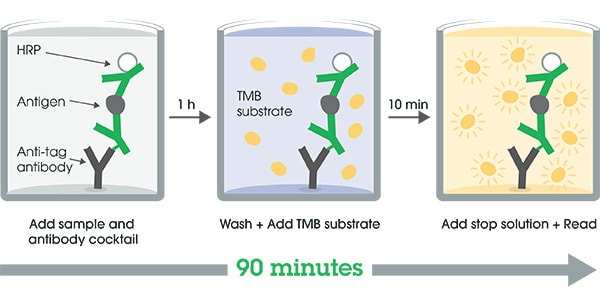Human Thrombin ELISA Kit (ab270210)
Key features and details
- One-wash 90 minute protocol
- Sensitivity: 55 pg/ml
- Range: 140.63 pg/ml - 9000 pg/ml
- Sample type: Cell culture media, Cit plasma, EDTA Plasma, Hep Plasma, Serum
- Detection method: Colorimetric
- Assay type: Sandwich (quantitative)
- Reacts with: Human
Overview
-
Product name
Human Thrombin ELISA Kit
See all Thrombin kits -
Detection method
Colorimetric -
Precision
Intra-assay Sample n Mean SD CV% Serum 3 2.4% Inter-assay Sample n Mean SD CV% Serum 8 3.8% -
Sample type
Serum, Cell culture media, Hep Plasma, EDTA Plasma, Cit plasma -
Assay type
Sandwich (quantitative) -
Sensitivity
55 pg/ml -
Range
140.63 pg/ml - 9000 pg/ml -
Recovery
Sample specific recovery Sample type Average % Range Serum 96 91% - 99% Cell culture media 97 96% - 101% Hep Plasma 91 90% - 92% EDTA Plasma 95 93% - 99% Cit plasma 92 91% - 93% -
Assay time
1h 30m -
Assay duration
One step assay -
Species reactivity
Reacts with: Human -
Product overview
Human Thrombin ELISA Kit (ab270210) is a single-wash 90 min sandwich ELISA designed for the quantitative measurement of Thrombin protein in cell culture media, edta plasma, serum, cit plasma, and hep plasma. It uses our proprietary SimpleStep ELISA® technology. Quantitate Human Thrombin with 55 pg/ml sensitivity.
SimpleStep ELISA® technology employs capture antibodies conjugated to an affinity tag that is recognized by the monoclonal antibody used to coat our SimpleStep ELISA® plates. This approach to sandwich ELISA allows the formation of the antibody-analyte sandwich complex in a single step, significantly reducing assay time. See the SimpleStep ELISA® protocol summary in the image section for further details. Our SimpleStep ELISA® technology provides several benefits:
- Single-wash protocol reduces assay time to 90 minutes or less
- High sensitivity, specificity and reproducibility from superior antibodies
- Fully validated in biological samples
- 96-wells plate breakable into 12 x 8 wells stripsA 384-well SimpleStep ELISA® microplate (ab203359) is available to use as an alternative to the 96-well microplate provided with SimpleStep ELISA® kits.
-
Notes
Thrombin (activated Factor II [IIa]) is a coagulation protein that has many effects in the coagulation cascade. Thrombin is a serine protease that converts soluble fibrinogen into insoluble strands of fibrin, as well as catalyzing many other coagulation-related reactions. Thrombin is in the form of alpha-thrombin that is the immediate end-product of prothrombin activation: two further thrombin products can be identified, beta- and gamma-thrombin. These are degraded forms that may arise from autodigestion of a thrombin preparation. Human Thrombin shares 81%, sequence homology with mouse and bovine as well as 80% with rat.
-
Platform
Pre-coated microplate (12 x 8 well strips)
Properties
-
Storage instructions
Store at +4°C. Please refer to protocols. -
Components 1 x 96 tests 10X Human Thrombin Capture Antibody 1 x 600µl 10X Human Thrombin Detector Antibody 1 x 600µl 10X Wash Buffer PT (ab206977) 1 x 20ml 50X Cell Extraction Enhancer Solution (ab193971) 1 x 1ml Antibody Diluent 4BI 1 x 6ml Human Thrombin Lyophilized Recombinant Protein 2 vials Plate Seals 1 unit Sample Diluent NS (ab193972) 1 x 50ml SimpleStep Pre-Coated 96-Well Microplate (ab206978) 1 unit Stop Solution 1 x 12ml TMB Development Solution 1 x 12ml -
Research areas
-
Function
Thrombin, which cleaves bonds after Arg and Lys, converts fibrinogen to fibrin and activates factors V, VII, VIII, XIII, and, in complex with thrombomodulin, protein C. Functions in blood homeostasis, inflammation and wound healing. -
Tissue specificity
Expressed by the liver and secreted in plasma. -
Involvement in disease
Factor II deficiency
Ischemic stroke
Thrombophilia due to thrombin defect
Pregnancy loss, recurrent, 2 -
Sequence similarities
Belongs to the peptidase S1 family.
Contains 1 Gla (gamma-carboxy-glutamate) domain.
Contains 2 kringle domains.
Contains 1 peptidase S1 domain. -
Post-translational
modificationsThe gamma-carboxyglutamyl residues, which bind calcium ions, result from the carboxylation of glutamyl residues by a microsomal enzyme, the vitamin K-dependent carboxylase. The modified residues are necessary for the calcium-dependent interaction with a negatively charged phospholipid surface, which is essential for the conversion of prothrombin to thrombin.
N-glycosylated. N-glycan heterogeneity at Asn-121: Hex3HexNAc3 (minor), Hex4HexNAc3 (minor) and Hex5HexNAc4 (major). At Asn-143: Hex4HexNAc3 (minor) and Hex5HexNAc4 (major). -
Cellular localization
Secreted, extracellular space. - Information by UniProt
-
Alternative names
- Coagulation factor II
- Coagulation factor II thrombin
- EC 3.4.21.5
see all -
Database links
- Entrez Gene: 2147 Human
- Omim: 176930 Human
- SwissProt: P00734 Human
- Unigene: 655207 Human
Images
-
SimpleStep ELISA technology allows the formation of the antibody-antigen complex in one single step, reducing assay time to 90 minutes. Add samples or standards and antibody mix to wells all at once, incubate, wash, and add your final substrate. See protocol for a detailed step-by-step guide.
-
The Thrombin standard curve was prepared as described in Section 10. Raw data values are shown in the table. Background-subtracted data values (mean +/- SD) are graphed.
-
The concentrations of Thrombin were measured in duplicates, interpolated from the Thrombin standard curves and corrected for sample dilution. Undiluted samples are as follows: serum 1:20,000, plasma (citrate) 1:10,000, plasma (EDTA) 1:10,000, and plasma (heparin) 1:10,000. The interpolated dilution factor corrected values are plotted (mean +/- SD, n=2). The mean Thrombin concentration was determined to be 56 µg/mL in serum, 34 µg/mL in plasma (citrate), 37 µg/mL in plasma (EDTA), and 31 µg/mL in plasma (heparin).
-
Interpolated dilution factor corrected values are plotted (mean +/- SD, n=2). The mean Thrombin concentration was determined to be 68 µg/mL with a range of 35 – 117 µg/mL.
-
To learn more about the advantages of recombinant antibodies see here.












